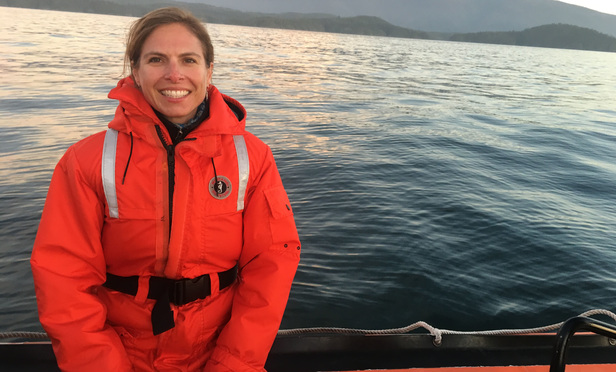 Natalie Barefoot on a research vessel in Vancouver Island North during its audit to become a Whale Heritage Site. (Courtesy photo)
Natalie Barefoot on a research vessel in Vancouver Island North during its audit to become a Whale Heritage Site. (Courtesy photo)
“Save the Whales” isn’t just a slogan to attorney Natalie Barefoot. It’s her job description.
Barefoot bills herself as the world’s only “cetacean lawyer,” working exclusively on law and policy matters pertaining to the planet’s whales and dolphins.
Barefoot founded the Key Largo, Florida-based nonprofit law firm Cet Law in 2015, after spending five years as an associate at Hogan Lovells’ Miami office working primarily on environmental litigation and after a stint with the United Nations Environment Programme. Before launching Cet Law, Barefoot worked for nearly a year in the field with researchers studying humpback whales in the Cook Islands and orcas in New Zealand to figure out how to leverage her legal experience to help the marine mammals she loves.
We caught up with Barefoot, a 2005 graduate of the University of Miami School of Law, this week to learn how she’s using the law to protect whales and what advice she has for attorneys thinking of leaving traditional law jobs to pursue their passions. Her answers have been edited for length.
What, exactly, do you do?
One of the things I found when I was in the field with scientists is that there is science and knowledge that is not being translated into policy to protect whales, dolphin and porpoises. A lot of time, the researchers on the ground have this knowledge but they don’t necessarily have the time to advocate for policy changes. Then you have governments that are overstretched and things of economic value like fishing licenses get put at the top of the priority list and [whale protections] get put at the bottom. Cet Law is there to try to fill that gap and take what we’ve learned and bring it to the policy arena.
What advice do you have for other lawyers who are contemplating leaving the traditional path to pursue their passion?
Do it. Make a plan and transition gently. I kind of jumped into it, and I could because I didn’t have children or a husband I needed to support, which makes it easier to leave a high-paying job. But if you have a passion, there is such a need for high-end legal work for a lot of these not-for-profit organizations. If you have a direction you want to go into, use your pro bono hours to help these organizations and get to know the issues and slowly transition. Maybe your role is to stay at a law firm and support the organizations and NGOs though pro bono work.
Sound clip of “Eddie Vedder,” a humpback whale. ©Cook Islands Whale Research
Have you always had a passion for whales?
Yes. For some reason, I’ve just always been drawn to them. I had pictures of them all over my walls when I was growing up. I’d force my family to go whale watching.
I loved every moment I was at Hogan Lovells. But you have this thing in your stomach that makes you say, “This isn’t it.” I went to the UN because I wanted to go back to international development, but I also found that wasn’t quite it. This is it. It’s focused on my passion, which is cetaceans and our ocean environment. I think it’s directed at an incredibly important issue for our generation that we need to get a handle on before it’s too late.
So Cet Law is a policy advocacy organization?
In some ways, yes. It’s the first year, and we’re still seeing where the needs are. One of the projects we’re working on is whale-watching regulations—helping facilitate processes for improving them. I was in the Azores earlier this year. The government is going through a process of revising their whale-watching regulations, and I was there as a support to that process.
What can countries do to better regulate whale watching?
The laws and the legal systems are so different and the challenges are so different from place to place. It depends on the culture of a place, the economics, and the species of cetaceans that are found in that area. For example, you need different boating regulations to protect humpback whales versus killer whales.
In Vancouver Island North, there has been a resurgence of the population of humpback whales. People didn’t understand that humpback whales are not as predictable, in terms of where they will surface, as the killer whales people were usually looking out for. They started a campaign called “See a blow and go slow.”
You can put in as many fabulous regulations as you want, but the enforcement side of it is also a huge factor. There are countries with fabulous regulation but they aren’t enforced, so they are effectively null as far as protecting and respecting cetaceans.
What are some other threats to whales and dolphins that might have a legal solution?
There are some big issues with entanglements. There are more nets out there and animals are getting caught in them. Ship strikes are also a huge issue. The [International Maritime Organization] is doing work on that, trying to create shipping lanes. Having one place where traffic goes is helpful.
Plastic pollution and pollution generally is a huge issue, especially for the toothed whales that feed on fish. The bigger the fish they feed on, the more [plastic] accumulates in their systems.
What is your coolest whale experience thus far?
The thing that took my breath away was the first time I heard humpback whales sing. It is so incredibly beautiful and haunting. It’s beyond anything you can image. It’s otherworldly to hear that. You can be in the water and you don’t even know where the whale is, but you can hear it underwater.
Contact Karen Sloan at [email protected]. On Twitter: KarenSloanNLJ




